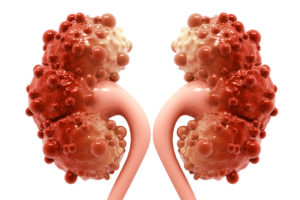Kidney cysts and Polycystic Kidney Disease
Kidney cysts are fluid filled sacs that can form on the outside or inside of a kidney. Termed ‘simple’ cysts, they are benign and generally cause little to no trouble. More complicated cysts (complex kidney cysts or complex renal cysts) can interfere with kidney function, or create other complications. Complex kidney cysts require close radiographic imaging (CT scan or MRI), or surgical removal since these cysts can be cancerous.
Kidney cysts are relatively common, and the incidence of forming cysts increases with advanced aging. Kidney cysts may also be part of a genetic disease that results in a slow, progressive decrease in kidney function. In this scenario, there is usually a family history of kidney disease. A kidney cyst diagnosis may involve the presence of one or more cysts. Polycystic kidney disease involves numerous cysts that cover one or both kidneys.
Symptoms of a kidney cyst
Quite commonly, no symptoms are present in individuals with renal cysts. Many times they are discovered during the imaging of a different health concern. On the other hand, some individuals, with large or multiple renal cysts, may experience blood in the urine (hematuria), flank pain, high blood pressure or fever (if the cyst becomes infected).
Evaluation and Treatment
If a kidney cyst is determined to be “simple”, treatment may not be necessary. However, the provider may advise monitoring the cyst. If the kidney cyst is deemed “complex”, it will require periodic imaging to assess its growth. If changes occur, surgical removal of the cyst or kidney may be necessary. Some complex renal cysts require immediate removal due to their risk of harboring cancer.
Some kidney cysts initiate a slow, progressive decline in kidney function. For these individuals, removal of the kidney may be appropriate due to repeated infections or chronic pain. When removal is advised, a minimally-invasive approach, such as laparoscopic or robot-assisted laparoscopic surgery can be used. In cases of large kidney cysts, an open procedure to remove the kidney may be recommended.
Polycystic kidney disease
Polycystic kidney disease is a genetic disease in which renal tubules become structurally abnormal, and covered with fluid filled cysts. These cysts can essentially take over the entire kidney, leading to several health concerns. Along with a disruption to normal kidney function, this disease can affect blood pressure, promote infection and cause bleeding. There are no medications to treat this disease. Patients may need to use dialysis to filter blood as the kidneys deteriorate.

